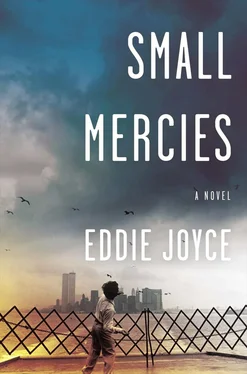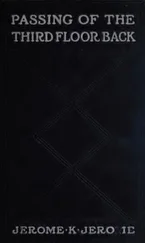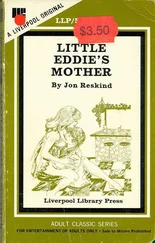Yes, she talks to Bobby all the time. She talks to the infant who slept beneath the sausages hanging in his grandfather’s attic. She talks to the lovesick teenager who bobbed up and down, doing calf raises. She talks to the inconsolable boy she once found here. She talks to all of them. And more.
But she can’t tell any of them this. She can’t tell them that life is crueler than she imagined, that its cruelties are like the stars: infinite, unfathomable.
She has to tell the man who is gone. Only he will understand.
She empties her mind. She flips up the hood of her slicker and cinches it. She starts to walk. The sand is moist, easier to traverse. She exhales.
Ease into it.
The mist feels good on her face. Suits her mood, the task at hand.
Go on now.
The rain is punitive, restorative. A confession of sorts.
Nearly there.
What a day.
“What a fucking day.”
Michael is standing in the doorway, eyes closed, drinking in the sun. The phrase strikes her, makes her smile. He isn’t big with the curses, not around her anyway. He looks back at her, winks good-bye. She does not know this yet, but his face will never quite look the same. A blemish of sadness will dot it forever more.
He is right, though. A beautiful day. Makes the heart ache, how beautiful it is. How blue the sky. Flawless. Spectacular. A cliché. A prelude.
And the air. Feels like crispness itself, the change of seasons captured in a breath. Invigorating.
She can’t even enjoy it. She is furious, driving Franky to the train in silence. Living at home again. Another false start into his life. Second day of a new job, secured by his brother, running late already. She can’t even look at him. He sits there, hung over and glum. She can smell the booze on him. She stops at the station.
“Bobby and I had a nice time last night.”
Well then.
She doesn’t answer. She drives off as soon as the door closes. She glances at the clock. 8:27. She is going to be late for work.
Work, lateness, responsibility, hangovers, anger. These all still matter.
We are still innocent.
And, then, we are not. The world changes in the space of hours. Time untethers itself.
She is home with Michael, watching in horror together, unsure what to do, unsure what this means. For their country. For their city. For their little patch of nothing that sits in its shadow.
She does math. The train to the ferry. The ferry to the city. He couldn’t have gotten there. She knows this, nothing else. She will feel better when she sees him, but distance is distance and speed is speed. And late, for once, is a good thing.
“Is Bobby working today?”
Slightest quiver in his voice. She looks over. He is doing his own math. He is calculating distances, average speeds, estimating traffic. His sums are not as tidy, his answers not as comforting.
“I don’t know.”
“Call Tina.”
She feels her soul drain from her chest.
“Michael, dear God, Michael.”
Somewhere deep inside of her, a howl is born. She will live with it until the grave.
They watch. They can do nothing else.
The city gasps.
Twice.
Mother of God.
The house fills with people. Tina, Franky. Peter wanders in later, shell-shocked. He was downtown when it happened, he says. Everything he saw is trapped behind his eyes. He is speechless.
All the people she loves collected under one roof.
Except one.
Hours pass. Information trickles in, none of it good. The house thickens with despair.
She thinks this: she would know. She would know . She would feel it somehow. And she doesn’t. She looks at Michael, but he won’t look at her. She would know, there would be some sign. She hammers in a nail of hope, pegs everything on it.
Tina teeters between hysterical and numb. Gail pulls her into an empty room.
“You cannot lose this child,” she says. Their eyes, clouded by tears, meet. They both know what she’s asking. What she’s demanding. Tina nods, bites her lip.
“He is gonna walk through that door any minute now.”
She believes this. She can see it. The door will open and he will be standing there. This will revert to something terrible, unspeakable, tragic. But something that happened to others.
Neighbors and friends bring food in aluminum trays. The Landinis, the Hudecs, the Dales. They tell her they are praying, they have tears in their eyes. The trays are accepted and heated in the oven. They are placed on the table and the lids are removed. The food — chicken parm, penne vodka — lies there, uneaten. The sun is nearly down when Tiny Terrio shows up. He sobs in Michael’s arms, as though it were his son who was missing.
The day turns to night, then back to day. No one moves, speaks. They cry, hope, pray. Tina sleeps on the couch in ten-minute intervals. Every time she wakes, she looks at the door. The ghost light of the television plays the same images over and over. They cannot watch. They must watch.
In the morning, Michael makes some calls. He still has some connections in the department. Every few hours, the phone rings and Michael answers. The calls are brief. He returns to the living room with another name. A friend of his or friend of the boys’. Someone from the neighborhood. Someone who went to school with the boys. Men they know. Some have sat in this living room, watched this television. Mostly firefighters, but others too, men who worked in the towers. It is early, but one thing is already clear: Staten Island has been hit hard.
The phone rings. Another name is whispered. The list grows.
She knows her son’s name is being whispered in other living rooms across Staten Island, across the city. Other phones are being answered and her son’s name is traveling from lips to ears. Men with stern faces are saying his name. She can almost hear it: Bobby Amendola.
More information trickles in. His company was there. He was there. Seen, entering one of the towers.
She doesn’t care. The information is meaningless. She would know. She would know. She will not abandon hope. They are still finding people. She decides, then and there, that she believes in miracles.
She goes to church. The pews are filled, people kneeling, hands clasped.
She makes the sign of the cross, walks the aisle, feels it shift and move beneath her feet, like a ship at sea. She stumbles into a pew.
She prays until her kneecaps ache.
Please, Lord, she prays, please. Please.
She drives home. She walks back into the living room. No one has moved. The television is showing something different. A Palestinian woman is clucking her tongue and raising her hands.
She’s celebrating .
And then Gail is gone. She feels something she’s never felt before. A rage so explosive she has this exact thought: I will cut out your heart and eat it. She is screaming, she is being restrained. They take her upstairs, Michael and Peter, and they hold her until she sleeps. She sleeps for twenty minutes, no longer.
When she wakes, her body is throbbing with one thought: Bobby is dead. Murdered.
* * *
Enough.
She stops walking, kneels down into the soft sand, keeps her eyes closed. She can sense him now: the man who would have been. The man he never got a chance to be.
She tells him about his kids, how they’re doing. She tells him that the Cody’s pool is no more. She tells him a joke that Michael told her on St. Patrick’s Day. She tells him she’ll be back to wish him a happy birthday in a few weeks. Finally, she tells him that his wife has met someone, that it’s serious and he’s a nice guy and he’s good with the kids.
She lets it sink in. He nods, smiles, is gone.
She stands, wipes wet sand off the knees of her pants. She dries her eyes. She looks out over the water, watches the rain pucker the surface of the sea in a thousand places. She turns, starts back in the direction of the car.
Читать дальше












